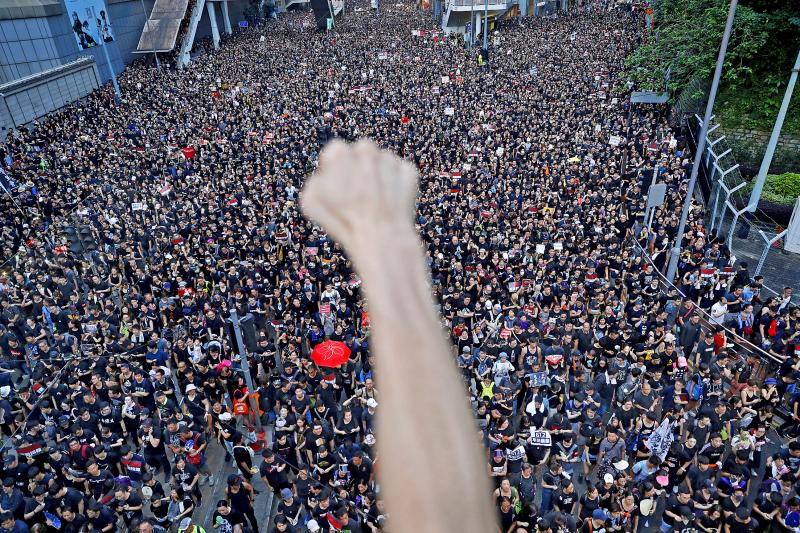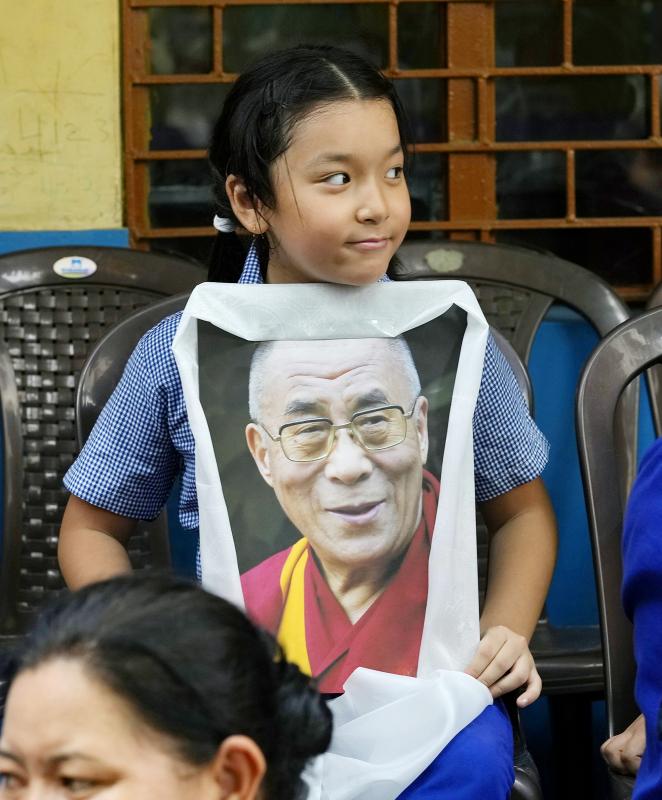On July 6 a group of influential American businesspeople published a letter in the Wall Street Journal (WSJ) calling for “a more constructive relationship with China” (“We Want to Rebuild US Relations With China,” by Maurice Greenberg). The signatories consisted of a group of prominent individuals with longtime China ties.
The piece was not completely stupid, recognizing that resuming communication with the expansionist, totalitarian state run from Beijing would require “…a willing response from the Chinese and a genuine commitment to proceed in good faith,” but it did posit an alternate universe in which US action was the cause of the problem, saying that after communication channels were eliminated during the Trump administration, the differences between China and the US increased, “as did the level of mistrust.”
CHINA APPEASERS

Photo: AP
Longtime China observer Derek Grossman commented on Twitter that nowhere did the piece mention human rights, Xinjiang, Taiwan, Hong Kong, the South China Sea, the East China Sea, Galwan or the “no limits” partnership with Russia. It also missed China’s military build up and its commitment to displacing the US as the world’s leading power, along with its thefts of western technology and markets, its malign United Front activities and, of course, the idea of democracy.
Apparently, none of these “increase the level of mistrust.”
In fact, simply change the writers’ names, and it could have been an “analysis” of US-China relations from Code Pink, the comical Quiao Collective, or any number of lost European leftists and tankies. If there is anything amusing in the increasingly sad global situation, it is the way that it has brought together Noam Chomsky and Henry Kissinger.

Photo: AP
The WSJ group wrote with certain knowledge of China’s cultivation of western businessmen to advance its own interests (imagine how readers might regard the piece if the WSJ had identified Max Baucus not as a former ambassador to China, but as a former advisor to Alibaba).
It goes without saying that there are no Chinese businessmen who can be similarly cultivated to advance US interests in China. This asymmetry also escaped the notice of the WSJ group.
Meanwhile, that week reality sent a memo to the unicorn and rainbows world of the WSJ opinion piece, with Chris Wray, director of the FBI, warning in a joint address with the head of MI5, Ken McCallum, that China was determined to steal technology from western firms. Wray discussed cases in which Chinese firms sent out people to dig up genetically modified seeds in the rural US to steal the technology, and in which the Chinese government attempted to interfere in a legislative election in New York state.
PARALLEL WITH NAZI GERMANY
That was a week after the global media reported on China’s attempt to use fake social media accounts to disrupt rare earth production in the US. Nikkei Asia also reported on the Chinese destruction of Germany’s solar panel industry, an augury of China’s drive to destroy Germany’s industries one by one.
“The sudden emergence of Chinese competitors wiped out Germany’s advanced solar power industry. Now, that experience is likely to repeat across a broad spectrum of industries,” Nikkei Asia wrote.
In the face of report after report from governments and institutions the world over discussing Chinese influence operations, its surveillance and exploitation of its citizens abroad, its increasing closure to outside influences and its malign political and technological intentions, I would love to say that the WSJ piece is astonishing. But anyone who knows the history of US businesses and authoritarian states would just call it business as usual.
It is historical fact that US firms such as Ford, IBM and IT&T worked with Nazi Germany throughout the 1930s and the war. Standard Oil’s fueling of Nazi Germany has been well chronicled in numerous books and articles.
“In two years Germany will be manufacturing oil and gas enough out of soft coal for a long war. The Standard Oil of New York is furnishing millions of dollars to help,” a 1933 report from the Commercial Attache of the US Embassy in Berlin warned. Standard Oil was supplying fuel technology and factory designs as late as 1939 and fuel itself well into the 1940s.
The German army, always logistically challenged, drew on Ford for a third of its trucks. Without the big Ford factory in Cologne, the Wehrmacht would have found forward movement far more difficult.
The involvement of major American firms with the Nazi military and party was rivaled only by their involvement with Soviet Russia, whose rise was propelled and sustained by imports of US and European technology. US Rubber, Ingersoll-Rand and Allis Chalmers all did business with Soviet Russia through the good offices of the industrialist Armand Hammer, for example.
Throughout the 1930s, US businesses aided these two nations dedicated to overthrowing the international order and poaching western technology, even though it was obvious to all observers that global war was brewing. Not just US firms — Standard Oil was able to ship oil to Nazi Germany using Dutch companies.
The parallel is very clear: today sober analysts in every major nation warn that Chinese expansionism will result in war in East Asia, yet US businesses continue to ask that the US sacrifice its national interests (and the peoples of Taiwan, Japan, Philippines, and elsewhere) on their behalf so they can make money in a country that will, so it is predicted, soon be killing Americans and their allies on a vast scale.
We already have the example of Ukraine, whose killing grounds are roamed by Russian military vehicles built with western technologies. For example, variants of Russia’s equivalent of the Humvee, the Tigr, run on Cummins’ engines and have Chrysler and Allison transmissions. As the Russians rape and murder Ukrainians in an imperialist war while threatening war, even nuclear war, against the US and its allies, many American firms, including the influential Koch empire, have refused to pull out of the country.
Ironically, the deputy chairman of the Russian Security Council, Dmitry Medvedev, said on Telegram on July 6, the day the WSJ group published their paean to a world that never existed, that “punishing a country that has one of the largest nuclear potentials is absurd. And potentially poses a threat to the existence of humanity.”
ENABLING CHINA’S WAR MACHINE
Far from creating peace, as many warned at that time, trade with Russia made it possible for Russia to invade Ukraine. Without its dependence on Russian energy, Germany would be in a far better position to resist Russian imperialism in Europe. Russia would have a far less capable military as well. Just like the Germans in 1939, who could not have fielded so capable a military without the help of firms from their rivals.
And here we are, doing it again.
I would bet money that when the war with China finally begins, many large Western firms will work out ways to keep doing business with the mortal enemy of Western democracy, as their allies and countrymen die on battlefields across Asia. I would, I mean, but I doubt I could find anyone with any knowledge of history to take that bet.
“We are confident that like-minded people in China would embrace the opportunity to work together to find solutions,” the WSJ group said.
Oddly enough, I too am confident that this group can find like-minded people in China.
Notes from Central Taiwan is a column written by long-term resident Michael Turton, who provides incisive commentary informed by three decades of living in and writing about his adoptive country. The views expressed here are his own.

Taiwan has next to no political engagement in Myanmar, either with the ruling military junta nor the dozens of armed groups who’ve in the last five years taken over around two-thirds of the nation’s territory in a sprawling, patchwork civil war. But early last month, the leader of one relatively minor Burmese revolutionary faction, General Nerdah Bomya, who is also an alleged war criminal, made a low key visit to Taipei, where he met with a member of President William Lai’s (賴清德) staff, a retired Taiwanese military official and several academics. “I feel like Taiwan is a good example of

March 2 to March 8 Gunfire rang out along the shore of the frontline island of Lieyu (烈嶼) on a foggy afternoon on March 7, 1987. By the time it was over, about 20 unarmed Vietnamese refugees — men, women, elderly and children — were dead. They were hastily buried, followed by decades of silence. Months later, opposition politicians and journalists tried to uncover what had happened, but conflicting accounts only deepened the confusion. One version suggested that government troops had mistakenly killed their own operatives attempting to return home from Vietnam. The military maintained that the

Jacques Poissant’s suffering stopped the day he asked his daughter if it would be “cowardly to ask to be helped to die.” The retired Canadian insurance adviser was 93, and “was wasting away” after a long battle with prostate cancer. “He no longer had any zest for life,” Josee Poissant said. Last year her mother made the same choice at 96 when she realized she would not be getting out of hospital. She died surrounded by her children and their partners listening to the music she loved. “She was at peace. She sang until she went to sleep.” Josee Poissant remembers it as a beautiful

Before the last section of the round-the-island railway was electrified, one old blue train still chugged back and forth between Pingtung County’s Fangliao (枋寮) and Taitung (台東) stations once a day. It was so slow, was so hot (it had no air conditioning) and covered such a short distance, that the low fare still failed to attract many riders. This relic of the past was finally retired when the South Link Line was fully electrified on Dec. 23, 2020. A wave of nostalgia surrounded the termination of the Ordinary Train service, as these train carriages had been in use for decades